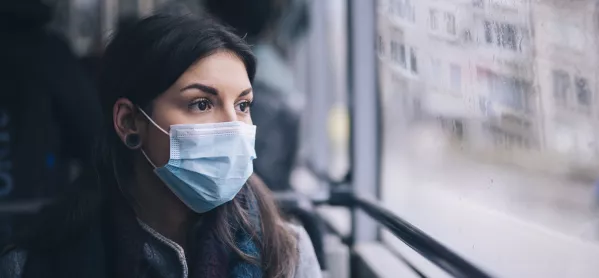Teachers and pupils not kept safe enough, Sturgeon told

Coronavirus measures in Scotland are not keeping school pupils and staff safe enough, the EIS teaching union has warned the first minister.
In a letter to Nicola Sturgeon, EIS general secretary Larry Flanagan urged her not to keep schools open “at all costs”.
The union has also published two briefing documents, one formed from comments made by teachers on teaching in level 4 areas - the severest level of Covid restrictions - and the other on pupil behaviour during the pandemic.
Related: Teachers balloted over Christmas school closures
Background: Threat of industrial action over not closing schools
Christmas holidays: Heads ‘devastated’ by decision not to close early
Comments from more than 3,000 teachers working in the toughest restrictions were seen by the union, with many calling for blended learning to be put in place.
Coronavirus: Calls for online learning in schools
Some staff said social distancing is difficult to enforce due to the number of pupils, while others worried over their own health due to underlying conditions
Mr Flanagan told Ms Sturgeon: “You will be aware EIS members have been clear in supporting the priority of keeping schools open, despite their very real concerns about safety, but not at all costs, First Minister.”
He added: “As you will read, teachers are working in crowded classrooms where social distancing is not possible, often with inadequate cleaning supplies and protections.
“Schools are not Covid-free environments - look at the evidence - and current mitigations are not keeping staff or pupils safe enough.
“Mounting workload and the stress of working under such conditions is having a significant impact on the mental health and resilience of our education workforce.”
One teacher told the union anonymously: “A lot of lip service is being paid to staff welfare but this is not being seen in working practices. Staff morale is low and, as a result, the goodwill, on which schools sadly heavily rely, is going.”
The teacher added: “I fully appreciate that management teams are facing huge, unprecedented challenges and stresses during these times.
Fears for teachers’ mental health and wellbeing
“Staff welfare needs to be a real priority. Even just a genuine ‘check-in’ now and again to understand individual circumstances would help.”
Mr Flanagan told the first minister: “I would ask that you read the comments from the classroom and that, moving forward, your government does more to acknowledge and address the real fear and anxieties which exist in schools than has been the case to date, especially when we have areas operating at Level 4.”
The EIS launched a social media campaign on Friday urging teachers to share their coronavirus experiences using the hashtag #NotAtAllCosts.
It comes as the Glasgow association of the union launched a ballot of members over possible industrial action.
The EIS has repeatedly pushed for Glasgow City Council to put in place remote learning in the days before the Christmas break and outline the triggers for a full shift to at-home teaching.
A Scottish government spokesperson said: “The Health and Safety Executive provided very positive feedback on the way schools are implementing that guidance and we are monitoring the situation closely, along with emerging scientific evidence.
“There is no current direct evidence that transmission within schools plays a significant contributory role in driving increased rates of infection among children and ONS data has shown no evidence of any difference between the positivity rates of teachers and other school staff, relative to other worker groups of a similar age.
“We continue to have discussions with teachers, trades unions, local authorities, parents and young people as we move through the coronavirus crisis.”
You need a Tes subscription to read this article
Subscribe now to read this article and get other subscriber-only content:
- Unlimited access to all Tes magazine content
- Exclusive subscriber-only stories
- Award-winning email newsletters
Already a subscriber? Log in
You need a subscription to read this article
Subscribe now to read this article and get other subscriber-only content, including:
- Unlimited access to all Tes magazine content
- Exclusive subscriber-only stories
- Award-winning email newsletters